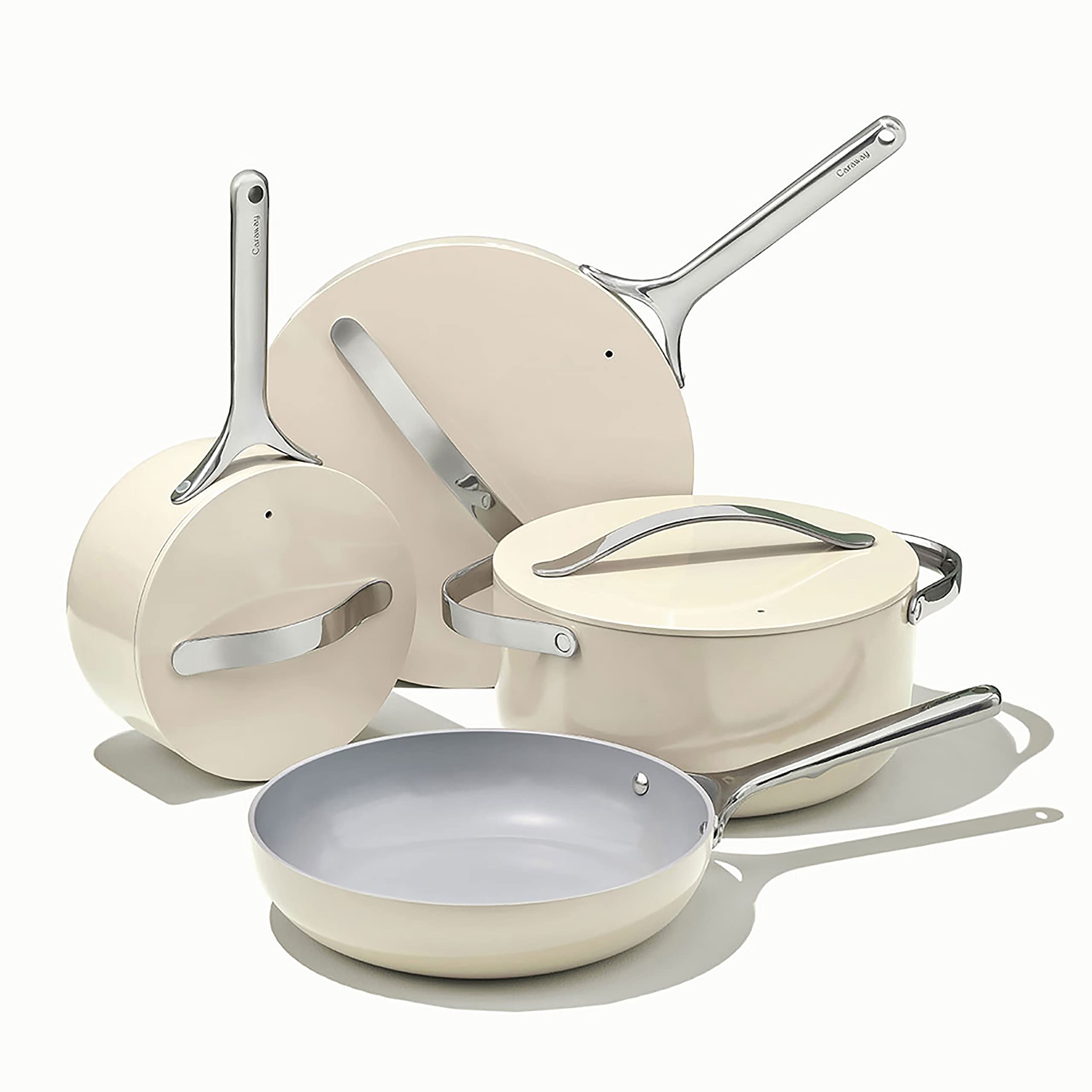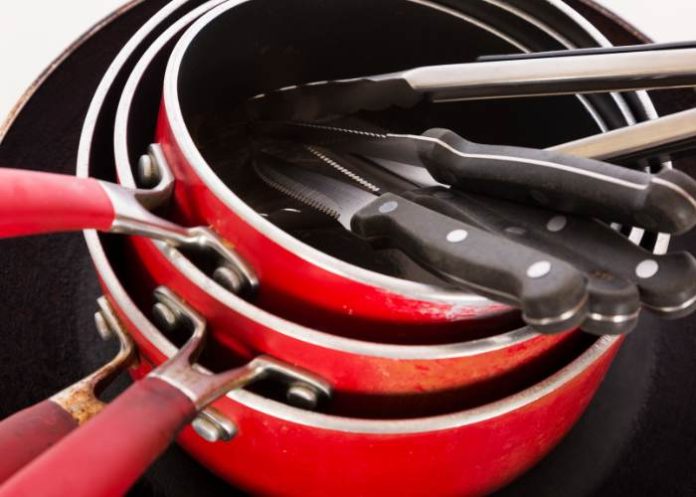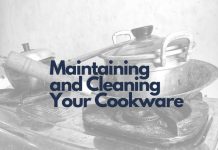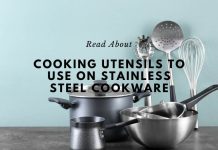Ceramic cookware is made of clay that has been heated to a high temperature. This process makes the cookware strong and durable. It also gives the cookware a non-stick surface.
Ceramic cookware is safe to use because it does not contain any harmful chemicals. The only downside to ceramic cookware is that it can be damaged easily if it is dropped or hit hard.
Ceramic pots and pans are safe to use as long as you take care of them properly. Avoid using abrasive cleaners or scrubbers on the surface, as this can damage the coating. Also, make sure to always use cooking utensils that are specifically designed for ceramic cookware, such as wooden or silicone-tipped utensils, to avoid scratching the surface.
When stored properly, ceramic cookware can last for many years.
The TRUTH about Ceramic Cookware
Is It Safe to Use Scratched Ceramic Pan?
When it comes to cooking with ceramic cookware, there are a few things you need to keep in mind. One of the most important is that you should never use a scratched ceramic pan. The reason for this is that the scratches can harbour bacteria and other contaminants that can be transferred to your food.
In addition, the scratches can also cause the pan to release harmful chemicals into your food. So, if you have a scratched ceramic pan, it’s best to get rid of it or at least make sure it’s properly sanitized before using it again.
When Should You Throw Out Ceramic Pans?
Ceramic pans are a great option for cooking, but like all cookware, they have a limited lifespan. Here are some signs that it’s time to toss your ceramic pan: 1. The surface is scratched or damaged.
2. The non-stick coating is peeling or flaking off. 3. You can see rust on the pan. 4. The pan is warped or misshapen.
If your ceramic pan shows any of these signs, it’s time to get rid of it and invest in a new one!
What are the Disadvantages of Ceramic Cookware?
If you’re considering outfitting your kitchen with ceramic cookware, you may want to weigh the pros and cons before making your decision. While ceramic cookware has some advantages, there are also some disadvantages that you should be aware of.
One of the biggest disadvantages of ceramic cookware is that it is more fragile than other types of cookware, such as stainless steel or cast iron.
Ceramic pots and pans can easily chip or crack if they’re dropped or banged against something hard. This means that they require a bit more care and handling than other types of cookware.
Another downside to ceramic cookware is that it isn’t compatible with all stovetops.
Is Ceramic Cookware Safer Than Nonstick?
When it comes to cookware, there are pros and cons to both ceramic and nonstick options. It really depends on your needs and preferences as to which is the better choice for you. Here, we will take a look at the pros and cons of each type of cookware to help you make a decision.
Ceramic cookware is often seen as the safer option because it does not contain any harmful chemicals like some nonstick cookware does. Nonstick cookware often contains chemicals like PFOA and PFOS, which have been linked to health problems like cancer and hormone disruption. Ceramic cookware is also less likely to scratch or chip than nonstick cookware, so there is less chance of these chemicals leaching into your food.
However, ceramic cookware can be more expensive than nonstick options and it may not be as durable.
Nonstick cookware is often seen as the easier option because it doesn’t require as much care or attention when cooking. You don’t need to use as much oil or butter when cooking with nonstick pans, which can be healthier for you.
Nonstick pans are also usually cheaper than ceramic pans. However, as mentioned before, the chemicals in some nonstick pans can be dangerous if they leach into your food. Nonstick pans can also scratch easily, which can release these harmful chemicals into your food.
So, which is the better option? It really depends on what you are looking for in a pan. If you want an affordable pan that is easy to use and care for, then nonstick might be the way to go.

Credit: www.amazon.com
Are Scratched Ceramic Pans Safe
If you’re anything like me, you love your ceramic cookware. It’s sleek, it’s non-stick, and it just looks so darn good in your kitchen. But what happens when that once pristine surface gets scratched?
Is it still safe to use?
The short answer is yes, scratched ceramic pans are still safe to use. However, there are a few things you should keep in mind.
First of all, deeper scratches can provide places for bacteria to grow. So be sure to clean your pan thoroughly after each use, especially if it has been scratched.
Secondly, scratches can also make the pan more susceptible to absorbing flavors and odors from food cooked in it.
This is why it’s important to only use gentle detergents and scrubbers on scratched ceramic cookware – harsh chemicals can further damage the surface and cause even more absorption.
Finally, while ceramic cookware is generally very durable, repeated scratching can eventually lead to chipping or even breaking of the surface. So if you notice any areas starting to wear thin, it’s best to stop using that particular piece of cookware altogether (or at least avoid using it for cooking acidic foods).
In conclusion, while scratched ceramic pans may not be as aesthetically pleasing as they once were, they are still perfectly safe to use – just be sure to take proper care of them!
Is Ceramic Cookware Non Stick
When it comes to cookware, non-stick is always a popular choice. But what about ceramic cookware? Is it non-stick?
The short answer is yes, ceramic cookware can be non-stick. But there are a few things to keep in mind. First, not all ceramic cookware is created equal.
Some brands are better than others when it comes to non-stick properties. Second, even the best ceramic cookware will eventually lose its non-stick qualities over time and with use. So if you’re looking for long-lasting non-stick performance, you might want to consider other options like Teflon or stainless steel.
But if you’re just looking for occasional use or don’t mind replacing your cookware every few years, then ceramic might be a good option for you. It’s generally more affordable than other materials and can still provide decent non-stick performance.
Ceramic Cookware Pros And Cons
Ceramic cookware is a type of pot or pan that is made from ceramic material. Ceramic cookware is becoming increasingly popular due to its many benefits, such as being environmentally friendly, durable, and easy to clean. However, there are also some drawbacks to using ceramic cookware, such as the fact that it can be expensive and fragile.
Here is a more detailed look at the pros and cons of ceramic cookware:
PROS
– Environmentally friendly: Ceramic cookware is made from natural materials, so it does not release any harmful chemicals into the environment.
– Durable: Ceramic cookware is very strong and resistant to scratches and chips. It can last for many years with proper care.
– Easy to clean: Ceramic cookware does not absorb food odors or flavors, so it is very easy to clean.
You can simply wipe it down with a damp cloth after use.
CONS
– Can be expensive: Some types of ceramic cookware can be quite pricey compared to other types of pots and pans on the market.
However, this cost may be worth it in the long run since ceramic cookware lasts much longer than cheaper alternatives. – Fragile: Although ceramic cookware is quite durable, it can still break if dropped or hit against a hard surface.
Is Ceramic Cookware Safe Reddit
If you’re looking for the safest cookware option, ceramic cookware is a good choice. Ceramic cookware is made of natural materials and doesn’t contain any harmful chemicals. However, there are a few things to keep in mind when using ceramic cookware.
First, always use cooking spray or oil when cooking with ceramic cookware. This will help prevent the food from sticking to the pan and making it difficult to clean. Second, be careful not to overheat the pan.
If the pan gets too hot, it can crack or break. Finally, always make sure to hand wash your ceramic cookware after each use.
Overall, ceramic cookware is a great option if you’re looking for safe and non-toxic cookware.
Just be sure to follow these simple tips and you’ll be able to enjoy your ceramic cookware for years to come!
Best Ceramic Cookware
Ceramic cookware is one of the best materials you can use for cooking. It’s non-reactive, so it won’t leach chemicals into your food. It’s also durable and easy to clean.
If you’re looking for ceramic cookware, there are a few things to keep in mind. First, make sure that the piece is made from high-quality ceramic. Second, look for a piece that has a smooth surface.
You don’t want one with a lot of nooks and crannies where food can get stuck. Finally, make sure the piece is oven-safe; not all ceramic cookware is rated for high temperatures.
Once you have your cookware, it’s time to start cooking!
Ceramic is great for all kinds of recipes, from simple sautees to complex casseroles. And because it heats evenly, you can be confident that your food will come out perfectly cooked every time.
Is Ceramic Cookware Good
If you’re like most people, you probably have a few pieces of ceramic cookware in your kitchen. But what exactly is ceramic cookware? And is it really any better than other types of cookware?
Ceramic cookware is made from clay that has been fired in a kiln. It’s non-porous, so it doesn’t absorb flavors or odors from food. And because it’s smooth, it’s easy to clean.
Ceramic cookware is also lightweight and conducts heat evenly, making it ideal for cooking delicate foods like fish and vegetables.
So, is ceramic cookware the best option for your kitchen? That depends on your needs and preferences.
If you’re looking for durable, easy-to-clean cookware that will last for years, then ceramic might be a good choice for you. However, if you’re looking for the absolute best cooking performance, then you might want to consider another type of material such as stainless steel or copper.
Ceramic Cookware Set
If you’re in the market for a new cookware set, you may be considering ceramic. Ceramic cookware sets are becoming increasingly popular, but there are a few things you should know before making your purchase.
First and foremost, ceramic cookware is non-stick.
This means that food will not stick to the surface of the pan, making it much easier to cook with and clean up afterwards. Non-stick surfaces also allow you to use less oil or butter when cooking, which can be healthier for you.
Ceramic cookware is also very durable.
It won’t scratch or chip easily, and can withstand high temperatures without warping. This makes it ideal for use on the stovetop or in the oven.
One downside of ceramic cookware is that it can be more expensive than other types of cookware sets.
However, it’s important to remember that you’ll likely have this set for many years, so it’s worth investing in quality pieces that will last. Another thing to keep in mind is that ceramic pots and pans often come in smaller sizes than their metal counterparts, so if you have a large family or entertain often, you may need more than one set.
Is Ceramic Coating Safer Than Teflon
Ceramic coatings are becoming increasingly popular as a way to protect cookware, but there is some debate about whether they are safer than Teflon. Ceramic coatings are made of inorganic materials, so they are not susceptible to the same health concerns as Teflon. They also have a very high melting point, so they can withstand higher temperatures without releasing harmful chemicals.
However, ceramic coatings can chip and release small particles into food, so it is important to use them properly and to choose products that are certified by an independent organization like the FDA.
Conclusion
Ceramic pots and pans are safe to use as long as they are used properly. Make sure to read the manufacturer’s instructions carefully before using them. Ceramic cookware is made of clay, minerals and metal oxides, which are fused together at high temperatures.
This makes it non-porous and resistant to scratches and staining. However, if ceramic cookware is not used correctly, it can break or chip easily.




